Inside Israel: Public Opinion and the War with Hamas
by u/DemosthenesRex
The Israel-Hamas conflict occupies a singular place in the political imagination of Israeli society, not merely as another theater of military confrontation but as a crucible in which questions of national identity, security, and moral responsibility are relentlessly contested. The most recent war has reawakened memories of earlier cycles of violence while introducing new dilemmas shaped by hostage diplomacy, international censure, and the enduring incapacity of political leaders to articulate a viable endgame. For Israelis, the war is not an abstraction or distant geopolitical event. It is an immediate and visceral reality, shaping the rhythms of daily life, from the sirens that punctuate civilian spaces to the funerals that define the nation’s collective mourning. Any analysis of the conflict must therefore begin not with military strategy or diplomatic maneuvering alone, but with the perceptions, fears, and aspirations of ordinary citizens who carry the psychic burden of a war without foreseeable resolution.
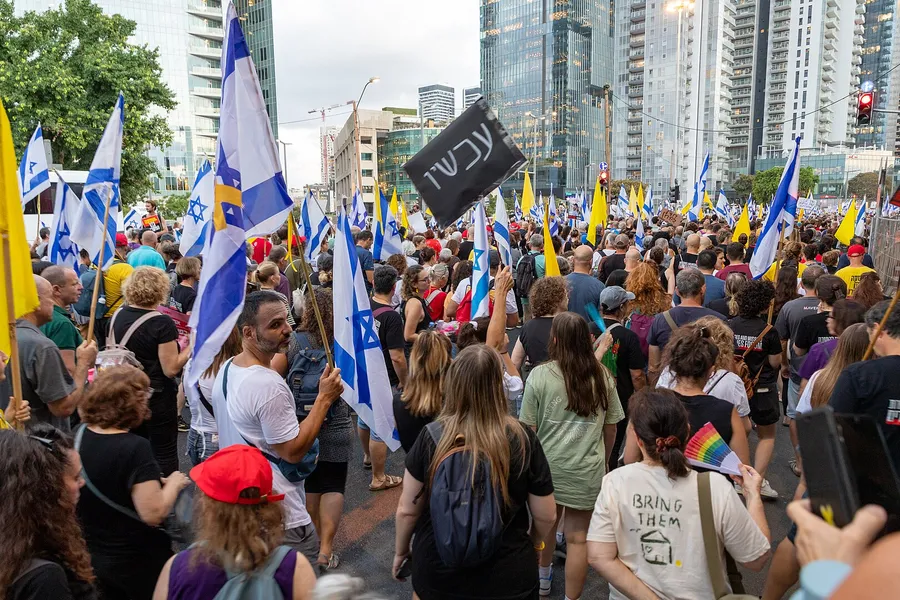
Demonstrators in Tel Aviv on 08/17/25, calling for an end to the war and a return of the remaining 50 hostages. By Oren Rozen - Own work, CC BY-SA 4.0, https://commons.wikimedia.org/w/index.php?curid=172894884
What distinguishes the current phase of the war from its predecessors is the convergence of overwhelming trauma and stubborn resilience within the Israeli body politic. The October 7 Hamas attacks shattered long-standing assumptions about deterrence, exposing vulnerabilities that many Israelis had come to believe were mitigated by superior military power and intelligence dominance. The sheer brutality of the assault, massacres in kibbutzim, kidnappings, and the symbolic desecration of Israeli sovereignty, altered the collective psychology of the nation, giving rise to both demands for absolute retribution and more anguished debates about the limits of vengeance. The trauma has not only intensified the vilification of Gaza writ large, but has also engendered a crisis of confidence in the government, which many view as complicit in failing to prevent the catastrophe. Thus, while public opinion is not monolithic, it vacillates between the poles of fury and despair, unity and recrimination.
At the same time, the war is interpreted by many Israelis through the lens of existential continuity, a struggle seen as inseparable from the country’s founding narrative of survival in a hostile environment. In this framing, the battle with Hamas is less about discrete territorial disputes than about the endurance of the state itself against adversaries committed to its destruction. This existential lens explains why support for military action remains high, even as skepticism grows about its efficacy in eradicating Hamas. It also illuminates why Israeli citizens can simultaneously endorse harsh measures against Gaza while expressing doubts about their leaders’ capacity to define a political horizon that transcends perpetual war. The public discourse thus reflects an uneasy balance: the instinct for self-preservation is tempered, though not erased, by the recognition that unending conflict corrodes both democracy and social cohesion.
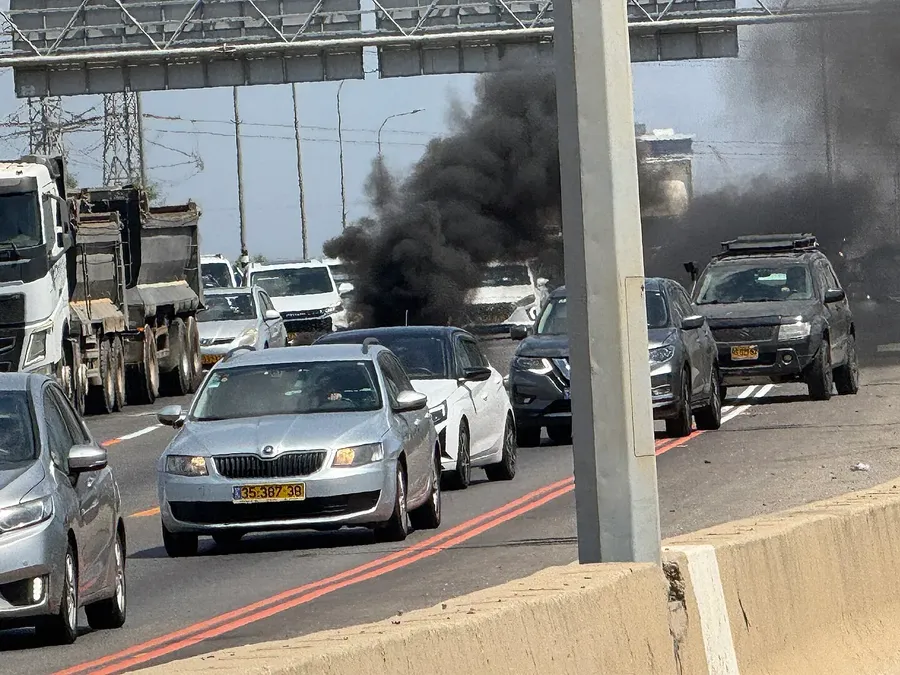
Tires burn on Highway 4 as part of a national "day of disruption" in Israel on August 26th. These demonstrations were aimed at ending the war in Gaza and negotiating a comprehensive hostage deal. By D Sella - Own work, CC0, https://commons.wikimedia.org/w/index.php?curid=172983260
Consequently, the question of how Israelis view the war, Hamas, and the prospects for ceasefire or settlement cannot be disentangled from the historical sentiment of past wars, the immediacy of national trauma, and the enduring preoccupation with security. The conflict’s significance for Israeli citizens lies precisely in this interweaving of personal vulnerability with national survival, producing a public discourse at once impassioned and fragmented. For policymakers and analysts alike, the challenge lies in discerning how these perceptions will shape not only the trajectory of the war itself but also the possibilities for what might follow. In the end, Israeli society’s interpretation of the conflict is both the product of history and the harbinger of its future, simultaneously echoing the unresolved past and foreshadowing the uncertain contours of peace or perpetual confrontation.
The relationship between Israel and Hamas is best understood as a protracted and unresolved struggle that has fused ideology and demography into a single, intractable problem. Since Hamas seized control of Gaza in 2007, following its electoral victory and violent expulsion of Fatah forces, the enclave has become the epicenter of recurring wars that neither side has sought nor managed to transform into a lasting peace. For Israelis, Hamas represents not simply another militant faction but a governing authority ideologically committed to Israel’s destruction, a reality that shapes the public’s perception of the conflict as existential rather than merely territorial. This framing has ensured that any engagement with Gaza is interpreted less as a matter of diplomacy and more as a test of national survival.
The cycle of wars, 2008–2009, 2012, 2014, 2021, and now the most catastrophic phase beginning in October 2023, has habituated Israeli society to a grim predictability. Each eruption produces enormous damage, a fragile ceasefire, and a return to uneasy stasis. Yet October 7 when Hamas launched its most lethal and symbolically shattering assault on southern Israel, broke that cycle. The mass killings, kidnappings, and infiltration across the border were perceived domestically as not merely another escalation but as a fundamental rupture in the promise of state security. The attack recalled the traumas of earlier wars, but it also struck at the core of Israel’s self-conception as a state capable of protecting its citizens, intensifying both public rage at Hamas and skepticism toward political leaders.
Public attitudes toward Hamas have therefore hardened into incongruity. Israelis regard Hamas as both intolerable and ineradicable. On one hand, Hamas’ capacity for violence has convinced the majority of Israelis that deterrence alone is insufficient, fueling support for maximalist rhetoric about eliminating the organization altogether. On the other hand, repeated wars and inconclusive outcomes have engendered a widespread awareness that such elimination may be unattainable, leaving the public trapped between anger and resignation. This paradox explains the oscillation in Israeli opinion between favoring overwhelming force and cautiously supporting ceasefires conditioned on hostage releases. Hamas functions in Israeli consciousness not only as an enemy but as a symbol of the state’s inability to achieve closure.
Thus, the historical context does more than explain the present war; it structures how Israelis interpret the meaning of conflict itself. Each successive round has deepened the conviction that Hamas embodies the continuity of existential threat, while simultaneously reinforcing the futility of expecting a final resolution. In this way, history has conditioned Israeli citizens to view the war not as an aberration but as a defining feature of national life, an unavoidable backdrop to politics, diplomacy, and identity. The current conflict is therefore perceived not only as another military campaign but as the culmination of a generational struggle, one that fuses past failures with the uncertain possibility of future transformation.
Israeli public opinion toward Hamas is marked by a blend of hardened enmity and pragmatic calculation. For the majority of Israelis, Hamas is not merely another militant group but rather an existential antagonist whose October 7 assault irreparably altered national consciousness. The brutality of that day, coupled with Hamas’ longstanding rocket campaigns and governance of Gaza, has deepened the widespread conviction that coexistence is impossible under the current conditions. Polling reflects a public overwhelmingly supportive of decisive military operations, yet simultaneously aware of the enduring difficulty of eradicating an entrenched and ideologically driven adversary. In this sense, Hamas represents not only a concrete security threat but also a recurring failure of Israeli deterrence, a reminder of the limits of force to secure long-term stability.
At the same time, the hostage crisis has emerged as a defining axis of public sentiment, complicating otherwise hawkish attitudes toward Hamas. Surveys conducted in 2024 indicate a significant portion of the population would accept a ceasefire, even at the expense of military momentum, if it guaranteed the release of all captives. This reflects a deep cultural and moral imperative within Israeli society that elevates the sanctity of individual lives and the duty to repatriate citizens. Yet such inclinations collide with another strand of public opinion, skeptical of Hamas’ reliability and fearful that any pause in fighting will allow the group to regroup militarily. The result is an ambivalent posture, oscillating between demands for uncompromising victory and the recognition of painful, short-term compromises.
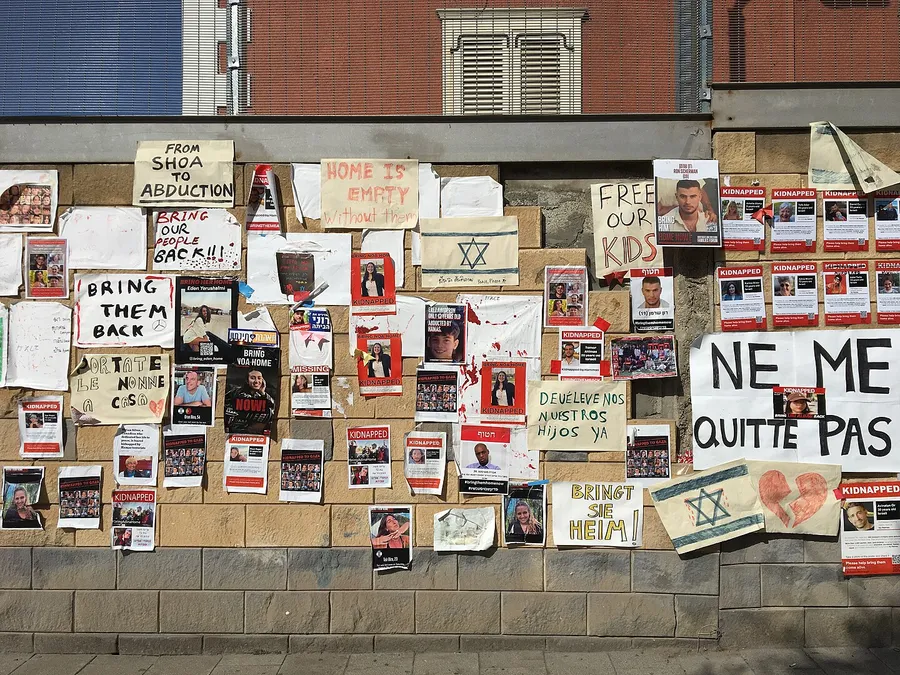
Kidnapped posters with photographs of the hostages and missing held in Gaza by Hamas, at the wall outside of the Kirya military base area. By Yossipik - Own work, CC BY-SA 4.0, https://commons.wikimedia.org/w/index.php?curid=140338180
The persistence of this ambivalence reflects broader divisions within Israeli society concerning the very definition of “victory” in Gaza. For hardliners and much of the right-wing political establishment, victory means the physical destruction of Hamas’ infrastructure, leadership, and governance capacity, regardless of the costs. For centrists and moderates, however, the war cannot be judged solely on military metrics; victory must also include the safe return of hostages and the establishment of a viable postwar arrangement that avoids indefinite occupation. The public’s unease with these competing definitions underscores the strategic ambiguity at the heart of Israel’s campaign. While maximalist rhetoric satisfies emotional and political demands, many Israelis are skeptical about its feasibility in practice. This divergence reveals not apathy but rather a fractured realism that questions whether absolute objectives can be reconciled with geopolitical constraints.
Finally, the discourse surrounding Hamas in Israeli society illuminates a deeper psychological struggle, whether the group is perceived primarily as a symptom of the broader conflict or as its central cause. For many, Hamas embodies irredeemable violence and an ideological commitment to Israel’s destruction, thereby justifying extreme countermeasures. Yet others, particularly within Israel’s minority communities and among dovish circles, interpret Hamas’ persistence as evidence of failed policies toward Gaza, including blockade and the absence of a political horizon. These divergent interpretations do not converge on a shared program for ending the conflict but rather sustain a political environment in which Hamas functions simultaneously as an object of fear, rage, and reluctant negotiation. In this sense, Israeli public opinion toward Hamas reflects not only judgments about the enemy but also a mirror of Israel’s own internal divisions over strategy, morality, and the burdens of protracted war.
Israeli attitudes toward the Israeli Defense Forces remain simultaneously reverential and critical, reflecting the ambivalence produced by a war that has exacted an extraordinary toll without delivering unambiguous victory. Historically, the IDF has been perceived within Israeli society as the ultimate guarantor of security, an institution more credible than political parties or governing coalitions. Yet the protracted campaign in Gaza has exposed the limits of military power in achieving decisive political outcomes, leading to doubts not about the bravery of soldiers but about the coherence of strategic direction. Many Israelis continue to rally around the IDF as a symbol of resilience, even as they question whether its operational choices have been subordinated to political imperatives rather than derived from professional military judgment.
The Israeli government, particularly under Prime Minister Netanyahu, occupies a more precarious position in public perception. The October 7 attacks and subsequent failures of intelligence have generated widespread anger toward political leadership, which many blame for negligence, hubris, or mismanagement. Netanyahu’s insistence on the maximalist goal of Hamas’ complete eradication resonates with certain constituencies but also appears increasingly disconnected from the realities of asymmetric warfare. Opinion surveys and commentary suggest a cleavage between citizens who accept the government’s rhetoric of existential struggle and those who view it as a diversion from accountability for pre-war lapses. As a result, the war has deepened existing fissures in Israeli politics, with critics charging that the pursuit of victory has become entangled with Netanyahu’s own struggle for political survival.
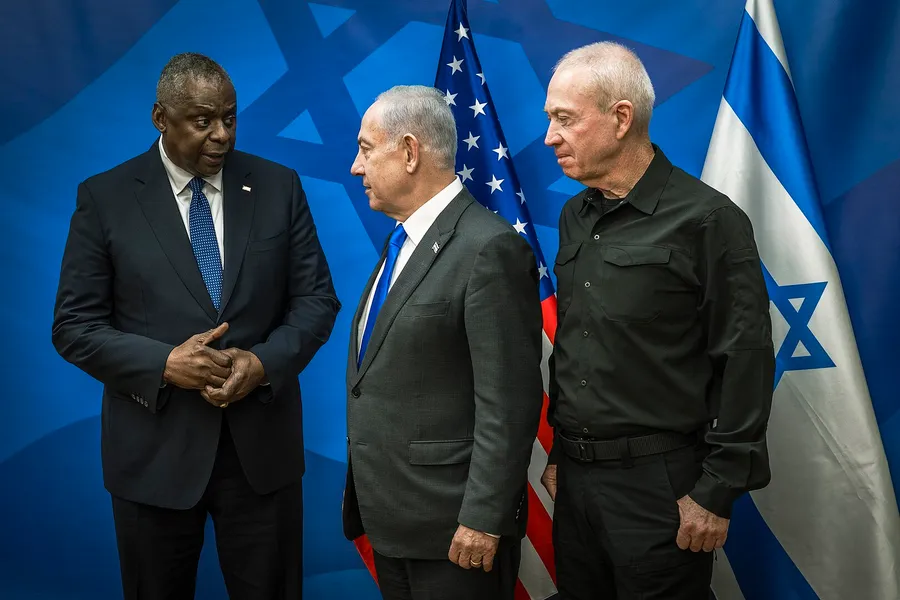
Former Secretary of Defense Lloyd J. Austin III meets with Israeli Prime Minister Benjamin Netanyahu and Minister of Defense Yoav Gallant in Tel Aviv, Israel, Oct. 13, 2023. By U.S. Secretary of Defense - 231013-D-TT977-1296, CC BY 2.0, https://commons.wikimedia.org/w/index.php?curid=138853892
This disjuncture between confidence in the military and suspicion of the government underscores a larger crisis of trust within Israeli society. The public distinguishes between the professional ethos of the IDF and the political calculations of those who command it, often perceiving the latter as cynical or self-serving. Israelis thus find themselves in a paradoxical position: supporting the continuation of military pressure on Hamas while simultaneously doubting the capacity of their leaders to translate battlefield gains into lasting security or diplomatic resolution. In effect, the government is judged not merely by its ability to wage war but by its failure to articulate a coherent postwar vision, a failure that many Israelis fear will leave the cycle of conflict intact.
For much of Israeli society, the war is understood primarily through the lens of survival rather than humanitarian calculus. The memory of October 7 remains central, shaping perceptions of the conflict as a defensive war against an implacable enemy whose tactics, indiscriminate rocket fire, tunnel warfare, hostage-taking, appear to preclude conventional political compromise. Within this framework, the destruction visited upon Gaza is rationalized as the inevitable consequence of dismantling a militant infrastructure embedded in civilian areas. Many Israelis, across the political spectrum, express little tolerance for international demands that prioritize Palestinian suffering over Israeli security, reinforcing a conviction that the world neither comprehends nor values Israel’s existential predicament.
That said, the scale of the humanitarian crisis in Gaza has not been ignored entirely within Israel. Media coverage has penetrated the discourse, prompting debates about proportionality and the ethical boundaries of military action. While right-wing voices often dismiss such concerns as naïve or manipulative, segments of Israel’s center-left, along with Arab-Israeli citizens, have articulated unease over the moral costs of the war. These voices remain a minority in the national conversation, but their presence underscores that Israeli public opinion is not monolithic, even in times of acute security threat. The result is a fragile balancing act between empathy and security imperatives, one that often collapses under the weight of renewed attacks or intensified combat.
International reactions have further complicated this dynamic. Israelis are acutely aware of the widening gulf between their perception of the war and the dominant narratives abroad, where Israel is frequently portrayed as the aggressor. The dissonance between domestic self-perception, as a besieged nation fighting for survival, and international condemnation for alleged war crimes reinforces what many Israelis describe as a “siege mentality.” This sense of isolation is not merely rhetorical; it has political consequences, hardening public attitudes and diminishing the appeal of compromise. For many citizens, global criticism confirms long-standing suspicions that Israel is held to a standard from which its adversaries are exempt.
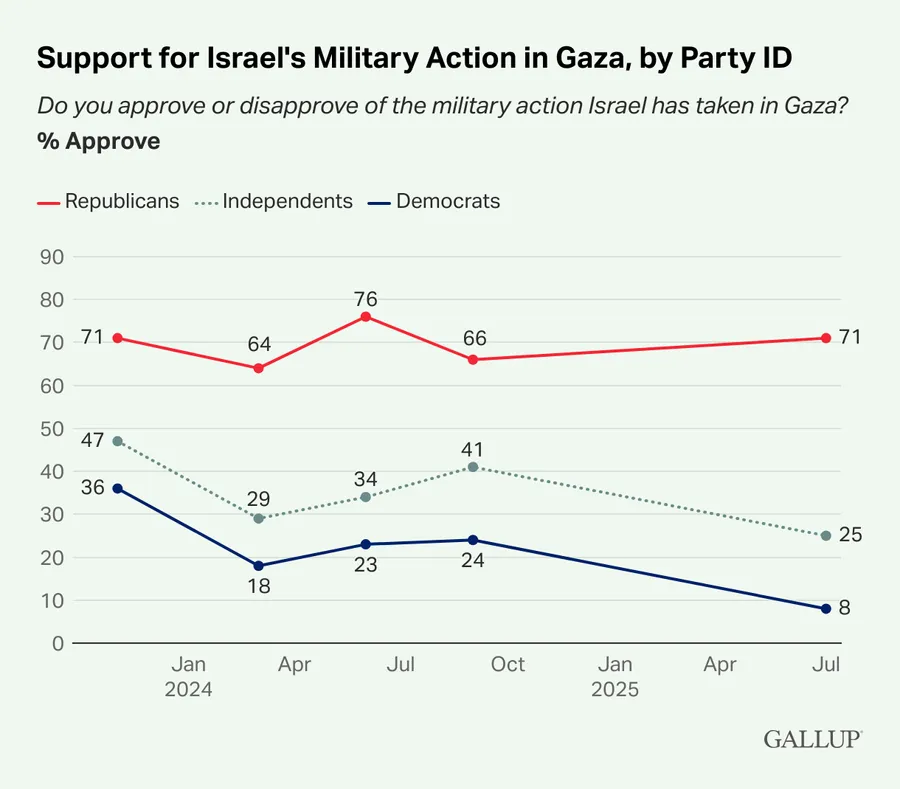
The tension between humanitarian concern and national security thus reflects a deeper incongruity at the heart of Israeli political culture. On one hand, Israelis desire international legitimacy and recognition of their vulnerability. On the other, the persistence of existential threats fosters an indifference to global opinion when it clashes with security priorities. This contradiction is magnified by generational divides. Younger Israelis, shaped by recurring wars and digital media, are more likely to express skepticism toward humanitarian critiques, whereas older generations recall periods of diplomacy and relative optimism about peace. In the end, the humanitarian dimension of the conflict is not absent from Israeli consciousness, but it is refracted through the prism of survival, identity, and a profound distrust of external judgment.
For many Israelis, the possibility of a ceasefire remains a double-edged proposition, shaped by the competing imperatives of humanitarian necessity and national security. On one hand, opinion surveys indicate significant support for a deal that would prioritize the return of hostages over continued military escalation, reflecting the moral weight of individual lives and the political pressure exerted by families of the captives. On the other hand, a parallel constituency insists that any pause in fighting would constitute a strategic error, granting Hamas the breathing space to rearm and reorganize, thereby perpetuating the very cycle of violence that the current campaign was designed to end. Thus, public discourse oscillates between compassion and calculation, revealing a society deeply unsettled by the trade-offs inherent in war termination.
Longer-term questions concerning Gaza’s governance reveal even starker divisions. Proposals for reoccupation, international trusteeship, or administration by the Palestinian Authority all meet with varying degrees of skepticism, if not outright rejection, among the Israeli public. The prevailing sentiment is that none of these frameworks can guarantee the permanent neutralization of Hamas, nor provide sufficient assurances against renewed hostilities. This skepticism is reinforced by a broader fatigue with externally imposed solutions, reflecting decades of failed peace processes that, in the Israeli imagination, have produced little beyond renewed violence. As a result, the horizon of possibility narrows. While elites in Washington or Brussels may speak of postwar reconstruction and state-building, many Israelis remain convinced that Gaza’s political future will be determined by force, not negotiation.
Underlying these debates is a deeper existential anxiety about the very feasibility of a final settlement. For a significant portion of Israeli society, the notion of definitive resolution with Hamas, or with Palestinian nationalism more broadly, has become nearly unthinkable. The lived experience of recurring wars and the memory of October 7th have entrenched a worldview in which conflict is not an aberration but a permanent condition of statehood in the Middle East. This normalization of war coexists uneasily with the public’s yearning for stability, creating a contradiction. While Israelis may express a pragmatic willingness to accept ceasefires for tactical reasons, few genuinely believe in the prospect of a lasting peace. Instead, the war is understood as an interminable struggle for survival, one in which settlements and ceasefires are provisional rather than transformative.
The Israeli public’s perceptions of the war against Hamas reveal a paradox that is both historically conditioned and acutely present. On one hand, there is an overwhelming consensus that national security must be safeguarded at virtually any cost, a sentiment rooted in the collective trauma of October 7 and amplified by decades of confrontation with militant actors. Yet, beneath this consensus lies a profound fragmentation. Israelis are not united on the methods of prosecuting the war, the balance between military victory and humanitarian restraint, or the political leadership tasked with defining a long-term strategy. This dissonance underscores the complexity of a society that sees itself as existentially besieged while simultaneously questioning the competence and vision of those governing it.

What emerges is a portrait of a citizenry that perceives its military as both indispensable and imperfect, its government as both indispensable and distrusted, and the war itself as both necessary and interminable. This ambiguity is not simply the product of a single conflict cycle but the culmination of a history in which wars with Hamas and other Palestinian factions have become cyclical rather than decisive. For many Israelis, the prospect of victory is no longer imagined as a clear endpoint but rather as the perpetual management of threats, punctuated by sporadic escalations and fragile ceasefires. That vision reflects a deeper pessimism about the capacity of politics, domestic or international, to resolve the underlying drivers of violence.
At the same time, Israeli attitudes toward ceasefire negotiations illustrate the tension between pragmatism and principle. The urgency of securing the release of hostages has introduced a willingness among significant segments of the population to contemplate concessions, even at the cost of a temporary truce with Hamas. Yet such pragmatism collides with the prevailing conviction that any pause in the conflict only serves to restore Hamas’s operational capacity. Thus, the Israeli public finds itself trapped in a cycle of contradictory imperatives to preserve human lives through negotiation while demanding unyielding military pressure to prevent recurrence. This duality is emblematic of a society perpetually balancing its own security anxieties with the burdens of an intractable adversary.
Ultimately, Israeli public opinion reflects both resilience and resignation. Resilience, in the sense that despite sustained attacks, political division, and international condemnation, the society continues to coalesce around a shared understanding of the existential stakes. Resignation, in that many Israelis no longer imagine a comprehensive resolution or final settlement as plausible, viewing perpetual conflict as the default condition of national survival. The conclusion is stark. For Israelis, war is not merely an aberration to be ended but a structural feature of political life, inseparable from questions of identity, legitimacy, and continuity. In this recognition lies the defining tension of Israeli society, an insistence on the necessity of security, countered by an awareness of the limits of both military force and political vision to provide it.